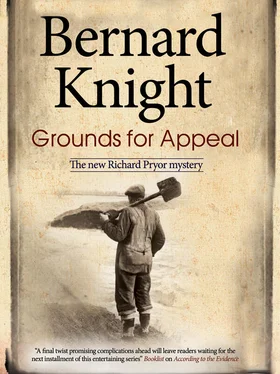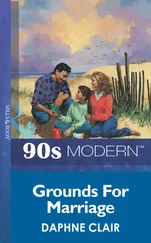Bernard Knight - Grounds for Appeal
Здесь есть возможность читать онлайн «Bernard Knight - Grounds for Appeal» весь текст электронной книги совершенно бесплатно (целиком полную версию без сокращений). В некоторых случаях можно слушать аудио, скачать через торрент в формате fb2 и присутствует краткое содержание. Жанр: Классический детектив, на английском языке. Описание произведения, (предисловие) а так же отзывы посетителей доступны на портале библиотеки ЛибКат.
- Название:Grounds for Appeal
- Автор:
- Жанр:
- Год:неизвестен
- ISBN:нет данных
- Рейтинг книги:4 / 5. Голосов: 1
-
Избранное:Добавить в избранное
- Отзывы:
-
Ваша оценка:
- 80
- 1
- 2
- 3
- 4
- 5
Grounds for Appeal: краткое содержание, описание и аннотация
Предлагаем к чтению аннотацию, описание, краткое содержание или предисловие (зависит от того, что написал сам автор книги «Grounds for Appeal»). Если вы не нашли необходимую информацию о книге — напишите в комментариях, мы постараемся отыскать её.
Grounds for Appeal — читать онлайн бесплатно полную книгу (весь текст) целиком
Ниже представлен текст книги, разбитый по страницам. Система сохранения места последней прочитанной страницы, позволяет с удобством читать онлайн бесплатно книгу «Grounds for Appeal», без необходимости каждый раз заново искать на чём Вы остановились. Поставьте закладку, и сможете в любой момент перейти на страницу, на которой закончили чтение.
Интервал:
Закладка:
‘My colleague is very experienced in that area,’ Richard assured him. ‘She was a senior biologist in the Metropolitan Police Laboratory, so if there’s anything to be found, she’s the one to find it.’
They spoke for a while longer, the solicitor telling him that the Appeal date had yet to be finalized but would probably be early in the New Year. Promising to send a preliminary report within a week, Richard took his leave and was back in Garth House a couple of hours later, having just missed a ferry at Aust.
Far too late for his lunch, Moira had kept it warm in the Aga and he sat in the kitchen in solitary state to eat his steak-and-kidney pie with mashed potato, followed by apple tart and custard. He had been abroad throughout all the difficult post-war years, so did not fully appreciate the recent improvement in living standards, following a decade of shortages that in some ways had been as severe as the war years themselves. He had missed most of the rationing, the spartan clothing bought on coupons with their E41 economy labels, unbranded ‘Pool’ petrol and books printed on thin, coarse paper.
As soon as he had finished, Angela, Priscilla and Sian came in to share the coffee that Moira was making and to hear what had happened in Bristol. He gave them a quick rundown of the case as he knew it so far, which was rather sketchy until he had read the case papers. ‘So basically, it’s an alibi problem. They say she did, she says she didn’t!’
Sian, whose left-wing views ran in her family, was always a fiery advocate for the underdog, especially if they were female.
‘Typical Establishment stitch-up!’ she snapped. ‘Some poor woman gets regularly beaten up by some drunken thug and when she cracks and sticks a knife in him, she gets life imprisonment and probably told she’s lucky not to have been hanged!’
Richard smiled at her predictably feisty reaction. ‘But she says she didn’t do it, Sian,’ he protested mildly. ‘And we’re being hired to see if we can prove she didn’t.’
Moira put down her coffee percolator. ‘I thought the prosecution had to prove guilt, not the defence prove innocence?’ she objected.
Angela looked at Richard and both their eyebrows rose.
‘We’ve got a budding lawyer in the house, folks! And you’re absolutely right, Moira. But in practice, the two things are not all that distinct, especially in an Appeal. The appellant’s lawyers try to torpedo the prosecution’s case.’
Priscilla was listening with interest to this dialogue.
‘I had a barrister boyfriend a couple of years ago and he used to say that evidence didn’t matter much in the Appeal Courts — they were more interested in procedural errors. If the trial judge put a foot wrong, that offered a better chance of succeeding with the Appeal than picking holes in the factual evidence.’
Moira listened intently as the three doctors bandied experiences and hearsay about the rigid legal system. When there was a pause, she declared her fascination with the law. ‘I used to be a typist in a solicitor’s office, but it’s only since I came to Garth House that it seemed to come alive for me. Thank goodness this poor woman in Bristol didn’t hang, as she might well have done. I suppose it’s all this fuss about Timothy Evans and John Christie that has made them reluctant to carry out the death penalty?’
‘Evans came from my home town of Merthyr, poor chap,’ said Richard, soberly. ‘I see there’s a strong movement again to get him a retrospective pardon this year.’
‘And push forward the political campaign for abolition of hanging,’ said Sian robustly. Timothy Evans had been hanged five years previously for murdering his wife and baby, but John Christie, the serial killer of Rillington Place in Notting Hill, had then confessed to the murders two years ago and caused a national furore about miscarriages of justice. Several major newspaper editors were trying to get the issue raised once again in Parliament, the campaign having been stimulated by the hanging of a woman, Ruth Ellis, earlier in the year.
Richard rose and started back to his office to read the file. ‘Better start seeing if we can do anything to help this unfortunate lady — though of course, she might be guilty anyway. We mustn’t prejudge these things.’
He winked at Sian as he left.
SEVEN
On the following Saturday afternoon, when Sian had gone home to Chepstow and Moira had returned to her house and little dog just down the road, the three doctors assembled in Angela’s sitting room in the front of the house. It was a typical Welsh autumn day outside, a cold drizzle under grey skies, so Richard had no urge to go out and play with his embryonic vineyard on the hillside behind the house.
Instead, he sat with Angela and Priscilla on the old but comfortable three-piece suite that had been Aunt Gladys’s pride and joy, to talk about the case that he had brought from Bristol. The main issue was medical, but there was the matter of the blood stains to consider and, in any case, he valued the general forensic acumen of the two women, who between them had a good many years’ experience.
Though Priscilla said she would be leaving them at the end of the month to return to London and look for a job, she was happy to join in the discussion. Her digs in Tintern Parva were comfortable enough but she didn’t particularly fancy spending a wet Saturday afternoon alone there. Richard had talked about getting a television set for Garth House, but so far nothing had materialized. They had agreed to go up to Monmouth that evening for a meal in one of the hotels, but for now, kicking around a forensic problem seemed the best option.
‘I’ve read through all that file,’ he said, pointing at the thick cardboard folder that lay on the low table in front of them. ‘Most of it is circumstantial stuff and umpteen witness statements, all of no real interest to us, apart from timings. You’re welcome to dredge though it, but the only two aspects that seem relevant to us are the time of death and these blood spots on Millie’s sleeve.’
‘Were the convicted woman and the dead man of different blood groups?’ asked Angela.
‘Yes, she was A-Rhesus positive, Shaw was O-positive, both very common groups. The Home Office lab in Bristol did the tests, so I doubt we can fault them.’
‘How good is the prosecution medical evidence on the time of death?’ asked Priscilla, cutting to the core of the matter.
‘In one word, lousy! It’s the old story of doctors who think they are Sherlock Holmes, instead of sticking to what can be proven. Their pathologist gives the time of death to within limits of one hour — which conveniently is the same hour in which Millicent Shaw’s alibi fails.’
‘Who was he, this doctor?’ queried Angela, snug on the settee with her elegant legs curled under her.
‘Anthony Claridge, a hospital pathologist from Gloucester. He was standing in for the regular chap in Bristol, who was on holiday.’
‘Never heard of him,’ said Angela. ‘Do you know him, Richard?’
‘I’ve met him in passing at a meeting of the Forensic Medicine Society. An old chap, must be about retiring age, I would think. Seemed a bit full of his own importance.’
He opened the file and took out a couple of pages covered in his own writing, notes he had made while reading through all the evidence.
‘Doctor Claridge wheels out all the old traditional stuff about estimating the time since death, most of which is incapable of proof. But with little better to put in its place, lawyers and judges are happy to go along with what’s in the old textbooks, most of which just copy from other books and previous editions, without any critical evaluation of its accuracy.’
Читать дальшеИнтервал:
Закладка:
Похожие книги на «Grounds for Appeal»
Представляем Вашему вниманию похожие книги на «Grounds for Appeal» списком для выбора. Мы отобрали схожую по названию и смыслу литературу в надежде предоставить читателям больше вариантов отыскать новые, интересные, ещё непрочитанные произведения.
Обсуждение, отзывы о книге «Grounds for Appeal» и просто собственные мнения читателей. Оставьте ваши комментарии, напишите, что Вы думаете о произведении, его смысле или главных героях. Укажите что конкретно понравилось, а что нет, и почему Вы так считаете.












